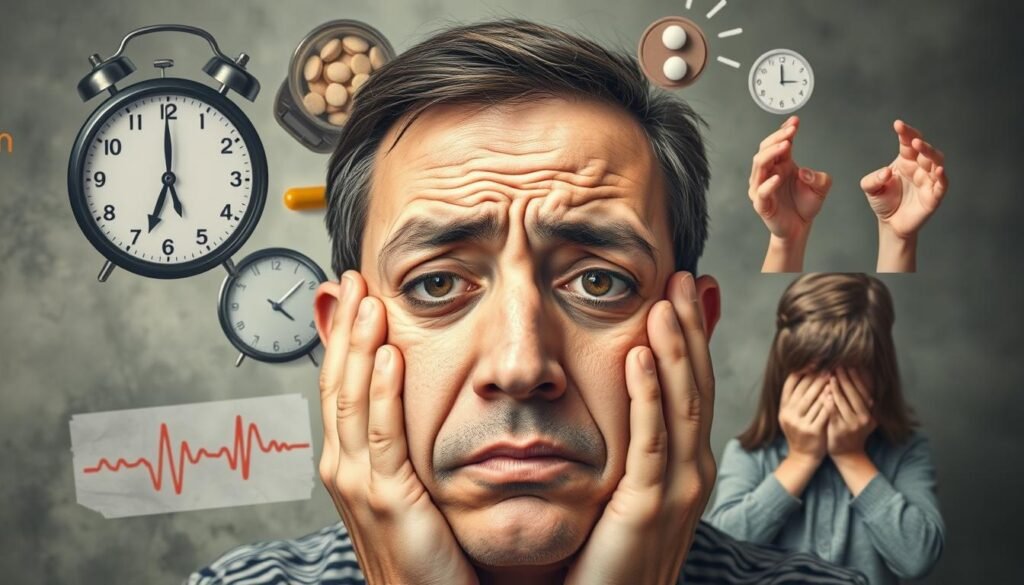Did you know over 1% of people taking prednisone face common side effects? These include weight gain, insomnia, and mood shifts. Prednisone is key for treating inflammation and autoimmune diseases. Yet, its effect on mental health is crucial to note. So, does prednisone lead to anxiety?
Doctors are seeing a link between prednisone and changes in mood, like anxiety and depression. While some might have mild mood changes, others face serious mental health challenges. This article explores how prednisone might cause anxiety, especially with long-term use or high doses. Check out more about prednisone side effects.
Key Takeaways
- Over 1% of individuals may encounter common side effects from prednisone use.
- Long-term and high-dose prednisone use increases the risk of serious side effects.
- Mood swings, including anxiety and depression, are potential side effects of prednisone.
- Rapid mood changes can occur, appearing irrational to those affected.
- Monitoring is crucial, especially for children and teens using high doses over time.
Understanding Prednisone and Its Uses
Prednisone is a well-known synthetic corticosteroid. It’s crucial for treating various health conditions. It works by calming the immune system and lowering inflammation. Prednisone uses cover disorders like allergies, asthma, and arthritis. It also helps with inflammatory bowel disease (IBD). This drug is a type of glucocorticoid, known for its ability to ease severe symptoms.
Prednisone acts like cortisol, helping against inflammation and immune reactions. It reduces pain, swelling, and redness. But, using it for a long time can cause issues. Problems like adrenal gland issues and higher infection risks may occur. Doctors stress the need for correct dosage and caution against stopping it suddenly. Doing so could harm your health.
It’s wise to see your doctor regularly if you’re on Prednisone. They can check for side effects, such as mood swings or physical changes. Prednisone might affect bone density, slow growth in kids, and raise the risk of certain cancers, like Kaposi’s sarcoma. Knowing these potential effects is crucial when using this powerful drug.
| Condition | Effectiveness |
|---|---|
| Allergies | Reduces histamine response and inflammation |
| Asthma | Decreases airway inflammation |
| Rheumatoid Arthritis | Relieves joint pain and swelling |
| Inflammatory Bowel Disease | Controls inflammation in the digestive tract |
Knowing how to properly use prednisone can make treatment more effective and safer.
For extra info on prednisone’s effects and safety tips, check out this resource.
Common Side Effects of Prednisone
Prednisone is a type of medication called a corticosteroid. It’s used to treat many health issues like autoimmune diseases, skin problems, and breathing troubles. But many who take prednisone soon see side effects.
Weight gain and feeling bloated are common issues for those on prednisone. Their body shape may change. Muscle weakness and swelling, or edema, can happen due to holding onto water. It can also cause mood swings, restlessness, or extra energy.
Some side effects from this medication include:
- Difficulty sleeping or insomnia
- Headaches
- Changes in menstrual bleeding patterns
- Nausea or vomiting
- Acne and skin thinning
- “Moon face,” which means a very round, full face
The dose and how long you take prednisone can affect side effects. Higher doses usually mean more issues. Always talk to your doctor if these side effects don’t go away or get worse after a few days.

It’s key to keep an eye on any negative reactions. Being on top of them can reduce discomfort and help make the most out of the treatment.
| Common Side Effects | Description |
|---|---|
| Weight Gain | Increased body mass often due to fluid retention. |
| Muscle Weakness | Reduction in muscle strength, impacting physical performance. |
| Bloating | Feeling of fullness due to fluid accumulation. |
| Emotional Changes | Mood swings, irritability, or anxiety. |
| Sleep Disturbances | Insomnia or difficulty falling asleep. |
| Skin Changes | Thinning skin, acne, and “moon face.” |
Can Prednisone Cause Anxiety?
Prednisone is often given for several health issues. While it helps, it also has side effects, especially on mental health. Knowing how prednisone and anxiety are connected can help us understand what patients go through.
The Link Between Prednisone and Anxiety
Studies show a clear link between prednisone and anxiety. About 28% of people taking corticosteroids feel anxious. This happens because the drug changes cortisol levels, which affects stress response. Moreover, around 11.3% felt anxiety or depression, highlighting the need for awareness.
How Dosage Affects Anxiety Levels
The amount of prednisone matters when it comes to side effects like anxiety. Higher doses increase the risk of such symptoms. Research shows the dose and how long you take it matter for mental effects. Adjusting when you take it and gradually lowering the dose can help manage anxiety.

| Aspect | Details |
|---|---|
| Medication | Prednisone |
| Common Symptoms | Mild to moderate anxiety reported in about 28% of users |
| Dosage Impact | Higher doses correlate with increased psychiatric symptoms |
| Adjustment Strategies | Timing adjustments and tapering under supervision |
| Alternative Approaches | Exploration of other glucocorticoid medications |
| Natural Remedies | Green tea, tryptophan-rich foods, valerian root, ashwagandha |
Corticosteroid Anxiety: What to Know
Patients on corticosteroids like prednisone might face corticosteroid anxiety. This type of anxiety includes feeling more nervous, agitated, and having trouble sleeping. A study in Riyadh at King Abdulaziz Medical City found about 5.5% of 3,138 patients taking these drugs developed mental issues, mainly anxiety.
Using prednisone can specifically make anxiety worse. This could be because it often comes with insomnia. This mix makes mental health concerns more complex for those taking these drugs. An investigation of 463 patients showed a 1.3% rate of psychiatric reactions from corticosteroid use.
There’s a significant link between the long-term use of these drugs and mental health problems. Up to 20% of patients taking large doses of glucocorticoids may face serious issues, like depression or psychosis.

Watching your mental health closely is key while on corticosteroids. Knowing the signs of anxiety can help catch and manage any psychological issues early. By understanding how corticosteroids and anxiety are connected, patients can work towards better health outcomes.
Mental Health Implications of Prednisone Use
Prednisone is a common corticosteroid with big effects on mental health. It’s important for people being treated to understand this. Mood shifts, like depression and psychosis, are often seen. Knowing about prednisone’s mental health effects helps manage its side effects.
Identifying Mood Changes While on Prednisone
Prednisone users may experience mood swings, feeling down, or easily upset. Every year, about 10 million people in the U.S. start taking oral steroids. Studies show that 26% of these individuals, especially those with eye conditions, can become manic, while 10% might get depressed. This shows why both patients and doctors must stay alert.
Common psychiatric symptoms include:
- Elevated mood or mania
- Depression
- Irritability
- Insomnia
- Increased energy
- Anxiety
- Depersonalization
About 5-6% of adults on corticosteroids face severe mental effects. High doses of prednisone, over 80 mg/day, significantly raise the risk of psychiatric issues. Nearly 18.4% are impacted, compared to only 1.3% on lower doses. These symptoms usually start soon after beginning treatment, so it’s crucial to watch mood changes closely.
Adjusting or stopping prednisone often helps with psychiatric symptoms. Those with a past of serious mood disorders might need extra care. Making the connection between prednisone, mental health, and mood is key for patient safety.
| Dose of Prednisone | Percentage of Patients with Severe Psychiatric Reaction |
|---|---|
| Less than 40 mg/day | 1.3% |
| Above 80 mg/day | 18.4% |
Noticing early mood changes on prednisone helps with quick action. Talking to healthcare providers about any mood shifts is crucial. This prevents problems from getting worse, ensuring mental health is looked after.
Managing Prednisone Side Effects
Dealing with prednisone’s side effects can be hard, especially when it affects your mood and anxiety levels. Finding good ways to handle these side effects can really improve your life. Many have found success with strategies that look after both their mind and body. Using these techniques can help you manage how prednisone makes you feel.
Effective Strategies for Reducing Anxiety
For those feeling anxious because of prednisone, there are practical steps to feel more balanced. Here are some helpful methods:
- Timing Dose Appropriately: Taking your prednisone dose in the morning may lessen anxiety and help you sleep better.
- Good Sleep Hygiene: Keep a regular sleep schedule, stay away from stimulants before bedtime, and have a quiet bedtime routine.
- Breathing Exercises: Trying deep breathing or mindfulness can really bring down anxiety levels.
- Physical Activity: Regular exercise not only lifts your spirits but also helps manage prednisone-related weight gain.
Importance of Communication with Healthcare Providers
Talking openly with your healthcare team is key to managing side effects from prednisone. It’s important to share how you’re feeling, including any mood changes or anxiety. Healthcare workers can then adjust your treatment or suggest new approaches for better results. Keeping track of your symptoms can also help during these talks, making it easier to find the right approach for you.
| Strategy | Description | Potential Benefits |
|---|---|---|
| Timing of Dose | Taking the entire dose in the morning | Reduces anxiety and improves sleep |
| Sleep Hygiene | Maintaining a regular sleep schedule | Enhances overall mood and reduces fatigue |
| Breathing Exercises | Practicing mindfulness and deep breathing | Lowers anxiety levels |
| Physical Activity | Engaging in regular exercise | Boosts mood and counters weight gain |
Long-Term Effects of Prednisone on Mental Health
Prolonged use of prednisone can greatly affect mental health. People often face anxiety, trouble with memory, and cognitive issues. A study found that out of 3,138 patients on oral corticosteroids for over 28 days, about 5.5% had mental health problems. Anxiety, issues with sexual function, and depression were common.
Risk factors for these problems include gender, age, and the type of steroid used. Prednisolone was the steroid most linked to mental health risks. Individuals older than 49 saw more anxiety issues. Mood swings, from extreme happiness to deep sadness, are risks of long-term steroid use.
Long-term use of steroids can lead to serious mental health conditions, including psychosis. It’s key to monitor patients closely. Regular check-ups help manage symptoms and spot new mental health risks. Stopping prednisone should be slow, allowing the body to adjust.
For those struggling with the emotional effects of steroids, finding ways to relieve stress is helpful. Techniques like meditation and mindfulness can be beneficial. It’s important to adjust how we manage our mental health under these circumstances. Knowing the effects helps people take action and seek help when needed. For more on managing anxiety, check out this guide. For information on mental health effects of steroid use, see this overview.
Summary of Serious Side Effects to Watch For
Patients on prednisone should always watch out for serious side effects. This drug helps with many conditions but also has health risks.
It’s crucial to monitor symptoms closely. Be on the lookout for:
- Severe mood swings or emotional disturbances
- Hallucinations or significant cognitive changes
- Signs of infection, like fever or chills
- Intense stomach pain
- Changes in blood sugar levels
Respond quickly if you notice these symptoms. Monitoring side effects can help you avoid bigger issues. For details on low-dose prednisone, check out this resource here.
Staying informed and managing your health is key with prednisone. Ignoring serious side effects can lead to worse health problems.
| Serious Side Effect | Symptoms | Action Required |
|---|---|---|
| Severe Mood Swings | Extreme changes in mood or behavior | Seek immediate medical help |
| Hallucinations | Visual or auditory disturbances | Contact a healthcare provider |
| Signs of Infection | Fever, chills, or persistent cough | Get medical evaluation |
| Gastrointestinal Distress | Severe stomach pain, nausea | Consult with a doctor |
| Blood Sugar Changes | Unusual fluctuations, increased thirst | Monitor levels, inform a physician |
Conclusion
Prednisone helps with conditions like rheumatoid arthritis and asthma. But, it can cause side effects, including anxiety. Understanding these effects is key for those on this medication. It’s vital for patients to watch how they react to the treatment and talk about any mood changes with their doctors.
It’s critical to manage the effects of prednisone for good health. Patients should be aware of withdrawal symptoms. These may be both physical and mental. Making life changes, like managing stress, exercising, and eating right, helps. This is especially true when stopping the drug.
Talking openly with healthcare providers is important. It helps in managing side effects better and improving treatment results. With the right monitoring and support, people can deal well with prednisone. This leads to better mental health and life quality.